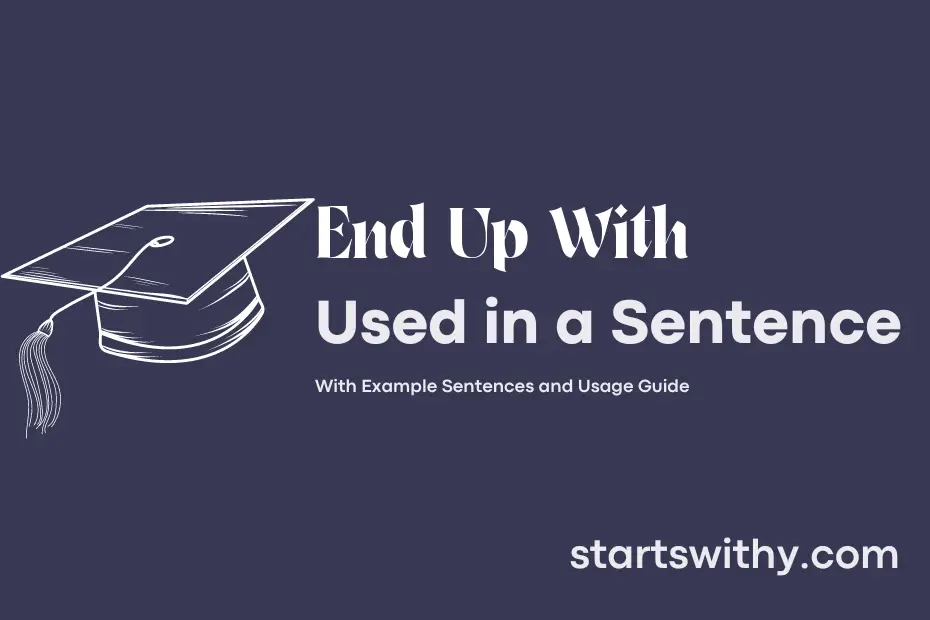Ever wondered how to correctly use the phrase “end up with” in English? This common expression is used to describe the result or outcome of a situation, often emphasizing unexpected or unplanned consequences.
When we say someone “ends up with” something, we are referring to the final position, possession, or situation they find themselves in after a series of events or decisions. It indicates a conclusion or resolution that may not have been initially foreseeable. So, if you’re looking to enhance your English vocabulary and fluency, mastering the usage of “end up with” is a valuable skill to have.
7 Examples Of End Up With Used In a Sentence For Kids
- We played outside and ended up with muddy clothes.
- I wanted yellow crayon but ended up with green.
- She couldn’t decide on a book and ended up with two.
- I wanted chocolate ice cream but ended up with strawberry.
- He started drawing a fish but ended up with a shark.
- They wanted to play soccer but ended up with volleyball.
- She tried to bake a cake but ended up with cookies.
14 Sentences with End Up With Examples
- I forgot to submit my assignment on time and **end up with a lower grade than expected.
- After hours of studying, I end up with a better understanding of the subject matter.
- I decided to skip class but end up with missing out on important information.
- By procrastinating, I end up with a pile of unfinished tasks at the end of the semester.
- I joined a study group to avoid confusion and end up with better exam results.
- End up with joining multiple clubs and societies to make the most of my college experience.
- Due to poor time management, I end up with studying all night before the exam.
- I planned to attend a lecture on time but end up with being late due to traffic.
- After attending career counseling sessions, I end up with clarity about my future goals.
- I decide to pull an all-nighter but end up with feeling exhausted the next day.
- By networking with professionals, I end up with valuable connections for internships.
- I aim to participate in extracurricular activities but end up with not having enough time.
- I neglect to revise for my exams and end up with struggling to recall important information.
- By seeking help from professors, I end up with a better understanding of complex concepts.
How To Use End Up With in Sentences?
To end up with is a phrasal verb that indicates the result or consequence of a situation or action. It is commonly used to describe a final outcome or what one ultimately obtains in the end. Here is a guide on how to use it correctly in a sentence:
- Subject + End Up With + Object: When constructing a sentence using “end up with,” ensure the subject is performing the action that leads to a final result.
Example: “I studied hard for the exam, and I ended up with a high grade.”
- Past Tense: “Ended up with” is the past tense form of the phrasal verb. Remember to use it when referring to actions that have already taken place.
Example: “After searching through many stores, she ended up with the perfect dress for the party.”
- Multiple Objects: “End up with” can be used with one or more objects in a sentence to describe what was obtained or achieved as a result.
Example: “She took various courses in college and ended up with a degree in Biology and a minor in Psychology.”
- Negative Form: To express a negative outcome or result, add “not” before “end up with” in the sentence.
Example: “I tried to fix my computer myself, but I did not end up with a working device.”
By following these guidelines, you can effectively use “end up with” in your sentences to describe the final outcome of a situation or action.
Conclusion
In conclusion, “sentences with end up with” often describe the outcome or result of a situation, illustrating how events or actions lead to a particular ending. These sentences typically suggest a finality or consequence, highlighting the ultimate outcome of a process or series of events.
By using “end up with” in sentences, one can effectively convey the outcome, consequences, or final destination of a given scenario. This phrase adds clarity and emphasis to the conclusion of a narrative, making it a useful tool for communicating the ultimate result or resolution of a story or situation.



